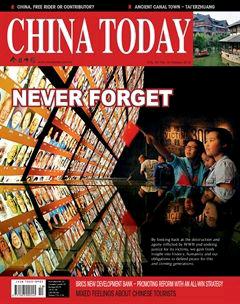Defense of Peace
China commemorated on September 3, 2014 the fi rst offi cial memorial day of the War of Resistance against Japanese Aggression and the anti-fascist war victory. The occasion affi rmed the justice of the anti-Japanese war and Chinas fi rm stance in safeguarding the achievements of WWII and maintaining world peace.
The Peoples Republic of China (PRC) was founded in 1949, four years after the end of WWII. Since its establishment, the PRC has embarked on a road of peaceful development. It abides by international laws and is a party to world peace treaties. As a permanent member of the UN Security Council, China is proactive in UN peacekeeping operations, and joins forces with other countries to solve confl icts through a multilateral approach.
Ideas and wisdoms relating to peace as embodied in the Chinese philosophies of Daoism, Buddhism, and Confucianism have infused into the countrys governance concepts, so contributing in their way to world peace.
As a developing country, China has advanced balanced and stable development in all fi elds through bold reforms. Healthy development in China contributes to world peace and progress, and provides opportunities for other countries.
At the opening ceremony on September 3, 2014 of the threeday The Party and the World Dialogue 2014, themed “Chinas New Reforms: The Role of the Party,” the Chinese Communist Partys ideas and plans were thoroughly explained and the effects of Chinas reforms discussed. The Dialogue helped the international community gain an objective understanding of the prospects of Chinas reforms and the nations future development.
Sergei Stanishev, president of Party of European Socialists and former Prime Minister of Bulgaria, and Muratbek Imanaliev, former foreign minister of Kyrgystan and former secretary-general of the Shanghai Cooperation Organization, delivered keynote speeches at the opening ceremony. Both statesmen confi rmed the signifi cance of Chinas reforms and the valuable opportunities they bring for international and regional development.
The global trends towards multipolarity and economic globalization are deepening Sino-European relations which are, in turn, exerting growing global infl uence. The second meeting of the Mechanism on China-EU High-Level People-to-People Dialogue took place in Beijing on September 6, 2014. This event is of great signifi cance in forging the four major China-EU partnerships towards peace, growth, reform, and civilization. In his letter of congratulation to the meeting, Chinese President Xi Jinping said that expanding China-EU people-to-people and cultural exchanges is vital to boosting mutual understanding, promoting social prosperity, and progressively deepening the China-EU comprehensive strategic partnership. Exchanges in such fi elds as education, science and technology, culture, media, youth, and women — newly added this year — are emerging highlights of China-EU exchanges and cooperation.
Over the last decade, the comprehensive strategic partnership between China and the EU has deepened development and brought rapid growth of economic and trade relations. In their midst, however, have occurred trade disputes, such as the photovoltaic confl ict, which need to be settled through a dialogue mechanism.
The photovoltaic confl ict involved the largest amount of money of any trade dispute case in the history of Sino-EU relations, according to a Chinese Academy of Social Sciences Blue Book released on August 29, 2014. It made both sides realize the urgent need for an early warning mechanism, and that the present dialogue mechanism must be improved to settle trade disputes more effectively.
This year marks the 35th anniversary of the establishment of Sino-U.S. diplomatic relations. China and the U.S. — the biggest developing country and the most powerful developed country —share broad common interests and shoulder common global responsibilities. Both countries are working together to build a partnership based on mutual respect, mutual benefi t, and win-win cooperation. Cui Tiankai, Chinas ambassador to the U.S., noted that a lack of understanding between the two nations may prompt some to suspect Chinas strategic intentions. But the fact is that Chinas grand strategy is open and transparent; it is to achieve rejuvenation of the Chinese nation and build a strong, democratic, civilized, and harmonious country, but not to seek global dominance, let alone challenge or supplant any other nation. No strategy from the Cold War era can solve todays problems. Any attempt to establish a confrontational military alliance will result in a nowin outcome. Nor will a hedging strategy of betting on both sides be helpful, as over-anxiety will cause a loss of hope and so make gloomy predictions come true.
Past experience is a guide for the future. The hardship and traumas that wars have caused might teach human beings to handle international relations more wisely and make greater efforts towards peaceful development, mutual benefi ts, and win-win results.

